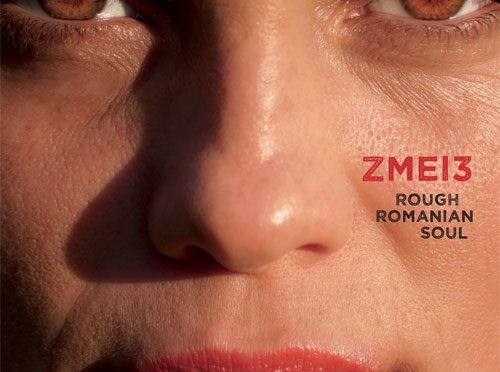Zmei3 – Rough Romanian Soul (Six Degrees, 2016)
If you look up influential or powerful vocalists, more likely than not you are going to run into female singers like Celine Dion, Mariah Carey and Whitney Houston or male singers like Freddie Mercury, Josh Groban and Elvis Presley. But these ridiculous lists hardly ever turn up results with the likes of Pakistan’s Nusrat Fateh Ali Khan, Flamenco singers Enrique Morente or Camaron de la Isla, Russia’s Vladimir Vysotsky, Cape Verde’s Cesaria Evora or even jazz singers like Billie Holiday or Nina Simone. Now, no offense to the up and coming Celine Dions or Whitney Houstons out there singing their little hearts out like the little, overproduced songbirds they are, but I often wonder what happened to those singers whose vocals speak more to the emotion of the song than the impossible notes they can belt out at top volume. You know, authentic singers using their voices to convey an emotional state rather than to just impress.
As luck would have it the Six Degrees release of Rough Romanian Soul by Zmei3 (pronounced zmay-tray), out on April 22nd, landed on my desk. Zmei3’s lead vocalist Paula Turcas, a former soprano opera singer, is all authentic vocals against a backdrop of vibraphones by vibe master Oli Bott, guitars and vocals by Mihai Victor Illiescu and double bass by Arnulf Ballhorn on this folksy, bluesy, jazzy, slightly quirky, avant-gardesque musical landscape of the rough road of the post-Communist Romanian soul.
The group of Romanian immigrant bandmates snagged Grammy award-winner producer Ian Brennan, who’s worked with the likes of Tinariwen, Zomba Prison Project and Ramblin’ Jack Elliot, by way of a Kickstarter funding campaign to cover costs of recording and travel, proving not only the tenacity of the group but also the inventive, can-do mentality that it takes to survive the rough road of a post-Communist life in Eastern Europe.
I was struck by a comment by Mr. Brennan in the press release where he explains, “Eastern Europe in general has been neglected by the rest of the world in terms of interest and exploration of music and culture. It has literally and deliberately been treated as a bloc. There is a great ignorance amongst many as to what Eastern Europe even is after World War II, so to have vibrant and modern music from Romania is a very valuable thing.”
A valiant and valuable thing indeed. Rough Romanian Soul opens with Ms. Turcas’s vocals and guitar lines on the moody” Stai Langa Mine” before giving way to a moody combo with vibes and bass. If you are looking for a frothy little folksy recording or a darkly villainous soundtrack to lurk about in a big cape and fangs, this is probably not the CD for you.
There are some lovely surprises on Rough Romanian Soul, like “Imn” with its indistinct and humming vocals, or catchy, folksy “ 2 Mai” or the moving “Poveste Din Tara Mea.” Other goodies include the riches of “Marie, Maria” with lonely vocals by Mr. Iliescu and harmonica, the alternatively rousing and bluesy “As Munci La Plug Si Coasa” and the lushly worked “Pana Cand Nu Te Lubeam.”
Ms. Turcas sums up the people and in a fashion their music this way, “The land is rough and the people strong, and our legacy is one of survival.”
Fans get a dose of tenacity on tracks like emotional “Ah!,” the elegantly guitar-laced “Intr-o Zi” and a tribute song to the resistance fighters from the 1950s “Vis.”
Rough Romanian Soul is a fierce, authentic, artfully crafted musical landscape.
Buy Rough Romanian Soul in North America
Buy Rough Romanian Soul in Europe
Author: TJ Nelson
TJ Nelson is a regular CD reviewer and editor at World Music Central. She is also a fiction writer. Check out her latest book, Chasing Athena’s Shadow.
Set in Pineboro, North Carolina, Chasing Athena’s Shadow follows the adventures of Grace, an adult literacy teacher, as she seeks to solve a long forgotten family mystery. Her charmingly dysfunctional family is of little help in her quest. Along with her best friends, an attractive Mexican teacher and an amiable gay chef, Grace must find the one fading memory that holds the key to why Grace’s great-grandmother, Athena, shot her husband on the courthouse steps in 1931.
Traversing the line between the Old South and New South, Grace will have to dig into the past to uncover Athena’s true crime.


